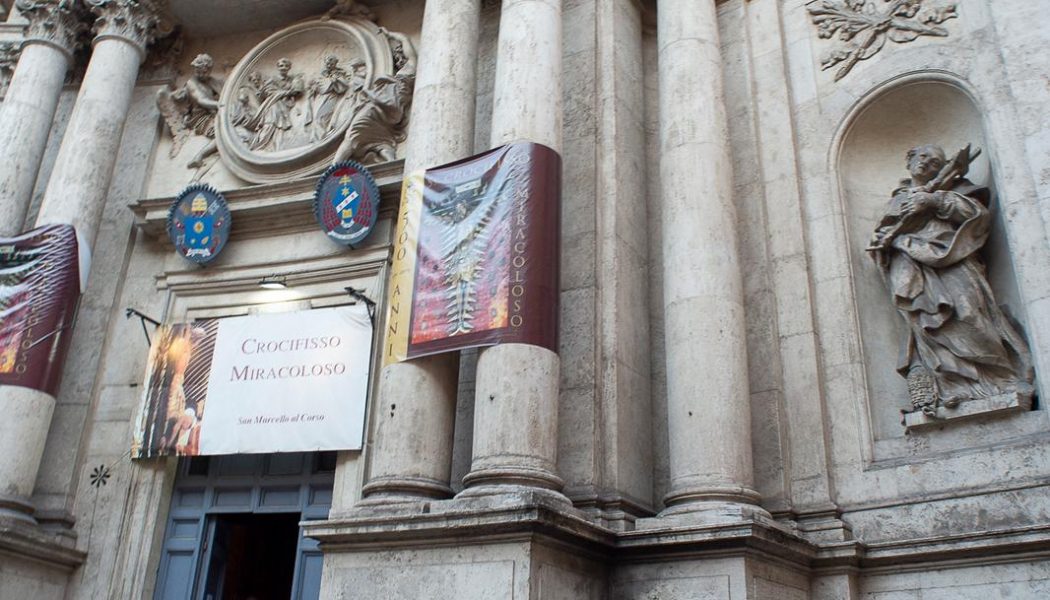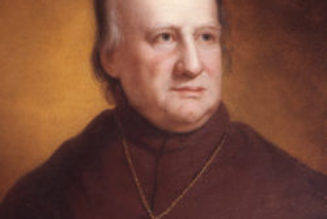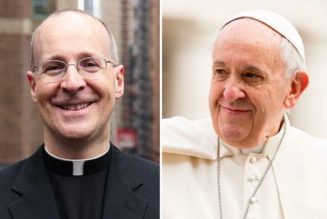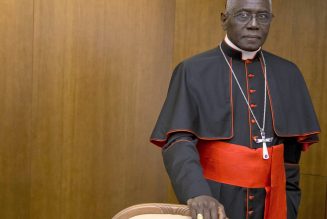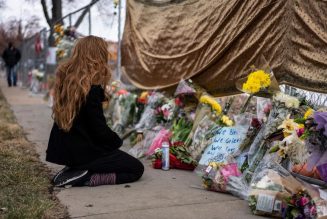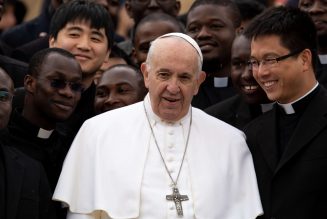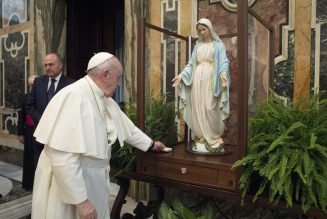Latest updates from the Eternal City in lockdown since March 10.
UPDATES (Rome time)
March 20, 4.10pm
In a second of two decrees, the Apostolic Penitentiary today ruled that in view of the difficulty in priests hearing confessions during the coronavirus pandemic, bishops can offer general absolution in cases of “grave necessity”.
The decree, signed by Major Penitentiary Cardinal Mauro Piacenza, notes that general absolution is usually only permitted in accordance with canon 961 – when there is an “imminent danger of death, since there is not enough time to hear the confessions of individual penitents,” or there is a “grave necessity.”
The decree then stresses in italics:
“This Apostolic Penitentiary believes that, especially in the places most affected by the pandemic contagion and until the phenomenon recedes, cases of grave necessity mentioned in can. 961, § 2 CIC [in cases of grave necessity] will occur.”
It adds that “any further specification is delegated by law to diocesan bishops, always taking into account the supreme good of the salvation of souls.”
The decree continues:
“Should there arise a sudden need to impart sacramental absolution to several faithful together, the priest is obliged to forewarn the diocesan bishop as far as possible or, if he cannot, to inform him as soon as possible (cf. Ordo Paenitentiae, n. 32).”
Regarding individual confession, it goes on to state that “in the present pandemic emergency,” it is “up to the diocesan bishop to indicate to priests and penitents the prudent attentions to be adopted in the individual celebration of sacramental reconciliation, such as the celebration in a ventilated place outside the confessional, the adoption of a suitable distance, the use of protective masks, without prejudice to absolute attention to the safeguarding of the sacramental seal and necessary discretion.
It adds:
“Furthermore, it is always up to the diocesan bishop to determine, in the territory of his own ecclesiastical circumscription and with regard to the level of pandemic contagion, the cases of grave necessity in which it is lawful to impart collective absolution: for example, at the entrance to hospital wards, where the infected faithful in danger of death are hospitalised, using as far as possible and with the appropriate precautions the means of amplifying the voice so that absolution may be heard.”
It adds that consideration should be given to the “need and advisability of setting up, where necessary, in agreement with the health authorities, groups of ‘extraordinary hospital chaplains,’ also on a voluntary basis and in compliance with the norms of protection from contagion, to guarantee the necessary spiritual assistance to the sick and dying.”
“Where the individual faithful find themselves in the painful impossibility of receiving sacramental absolution, it should be remembered that perfect contrition, coming from the love of God, beloved above all things, expressed by a sincere request for forgiveness (that which the penitent is at present able to express) and accompanied by votum confessionis, that is, by the firm resolution to have recourse, as soon as possible, to sacramental confession, obtains forgiveness of sins, even mortal ones (cf. CCC, no. 1452)”
March 20, 12.33pm
The Apostolic Penitentiary has issued a decree granting special indulgences to the faithful at this time of pandemic.
Signed on March 19, the Feast of St. Joseph, by Major Penitentiary Cardinal Mauro Piacenza, the decree states that:
“The Plenary Indulgence is granted to the faithful suffering from the Coronavirus, subject to quarantine by order of the health authority in hospitals or in their own homes if, with a spirit detached from any sin, they unite themselves spiritually through the media to the celebration of Holy Mass, to the recitation of the Holy Rosary, to the pious practice of the Way of the Cross or other forms of devotion, or if at least they will recite the Creed, the Lord’s Prayer and a pious invocation to the Blessed Virgin Mary, offering this trial in a spirit of faith in God and charity towards their brothers and sisters, with the will to fulfil the usual conditions (sacramental confession, Eucharistic communion and prayer according to the Holy Father’s intentions), as soon as possible.”
Cardinal Piacenza adds that the same gift of Plenary Indulgence will be given “under the same conditions” to:
“Health care workers, family members and all those who, following the example of the Good Samaritan, exposing themselves to the risk of contagion, care for the sick of Coronavirus according to the words of the divine Redeemer.“No man has greater love than this: to give his life for his friends” (Jn 15:13).”
He adds that the decree also “willingly grants” the Plenary Indulgence under the same conditions to:
“Those faithful who offer a visit to the Blessed Sacrament, or Eucharistic Adoration, or the reading of Sacred Scripture for at least half an hour, or the recitation of the Holy Rosary, or the pious exercise of the Way of the Cross, or the recitation of the Chaplet of Divine Mercy, to implore from Almighty God the end of the epidemic, relief for those who are afflicted and the eternal salvation of those whom the Lord has called to Himself.”
The decree continues:
“The Church prays for those who are unable to receive the Sacrament of the Anointing of the Sick and the Viaticum, entrusting each and every one of them to Divine Mercy by virtue of the communion of saints and granting the faithful a Plenary Indulgence on the point of death, provided that they are duly disposed and have recited a few prayers during their lifetime (in this case the Church makes up for the three usual conditions required). For the attainment of this indulgence the use of the crucifix or the cross is recommended (cf. Enchiridion indulgentiarum, n.12).”
The decree ends by invoking the “Blessed Virgin Mary, Mother of God and of the Church, Health of the Sick and Help of Christians, our Advocate, to help suffering humanity, rejecting from us the evil of this pandemic and obtaining for us every good necessary for our salvation and sanctification.”
Cardinal Piacenza begins the decree by noting that the “whole of humanity” is “threatened by an invisible and insidious disease which for some time now has become part of everyone’s life” and is “marked day after day by anguished fears, new uncertainties and above all widespread physical and moral suffering.”
He adds: “The Church, following the example of her Divine Master, has always cared for the sick. As Saint John Paul II indicated, the value of human suffering is twofold: “It is supernatural, because it is rooted in the divine mystery of the world’s redemption, and it is also profoundly human, because in it man finds himself, his humanity, his dignity, his mission” (Apostolic Letter Salvifici Doloris, 31).”
March 20, 11.19am
“A tragedy within a tragedy,” is how Il Giornale is describing it as another three priests are reported to have died in Bergamo — one of the northern Italian cities hardest hit by the coronavirus.
So far, 13 priests have died in Bergamo including Don Vincenzo Rini, a popular figure in bishops’ conference-run media. Another 15 are recovering in hospital with 2-3 in intensive care, Don Roberto Trussardi, director of Caritas in Bergamo, told InBlu Radio, the bishops’ conference radio station.
“It was a drama and a tragedy to see the army trucks take away more than 60 coffins because the crematorium could not keep up with all the deaths,” Don Trussardi said. “It’s really a tragedy,” he added. “Also yesterday there were so many deaths and infections. We hope that this awful situation will be resolved.”
Pope Francis called Bergamo’s Bishop Francesco Beschi on Wednesday to offer his consolation and encouragement.
Meanwhile, La Nazione newspaper is reporting that a total of 30 Italian priests have died mostly because of the coronavirus, including the 13 in Bergamo.
The newspaper reports that four very old priests died in Parma but also a younger one, Don Andrea Avanzini, who was 55 and probably infected by his elderly mother whom he lived with. It also reports that four other priests died in Piacenza although only one of them had been diagnosed with the coronavirus.
The bishop of nearby Cremona, Antonio Napolioni, has recovered from the virus and been discharged from hospital.
March 19, 1.53pm
Cardinal Jean-Claude Hollerich of Luxembourg has been placed in quarantine after an employee of the archdiocese tested positive for the virus, ACIStampa reports.
Cardinal Hollerich, a Jesuit whom Pope Francis elevated to the College of Cardinals last October, also serves as president of the Commission of Bishops’ Conferences in the European Union (COMECE).
He told a journalist on the phone that he would like to see more solidarity among European nations to deal with the crisis, and stressed the importance of keeping churches open at this time.
March 19, 1.20pm
 San Marcello al Corso, the church where Pope Francis prayed on Sunday at the foot of a Miraculous Crucifix that, in 1522, protected Rome from the Great Plague, is closed to the public due to a March 12 decree issued by Vicariate of Rome closing all non-parish churches, the journalist Diane Montagna has tweeted after confirming it with the church.
San Marcello al Corso, the church where Pope Francis prayed on Sunday at the foot of a Miraculous Crucifix that, in 1522, protected Rome from the Great Plague, is closed to the public due to a March 12 decree issued by Vicariate of Rome closing all non-parish churches, the journalist Diane Montagna has tweeted after confirming it with the church.
The Vicariate had changed an earlier decree to allow parish and mission churches in Rome to remain open last week, but not non-parish ones and religious houses which remain inaccessible to the public or those not permanently resident. (Photo: Vatican Media)
March 19, 1.12pm
Italian Prime Minister Giuseppe Conte has said the lockdown in the country will be extended beyond April 3, ANSA reports.
In an interview with Corriere della Sera, Conte said the measures were working, but that even when the epidemic starts falling from its peak, “we won’t be able to return to life as it was before.”
He urged all Italians to show “common sense” and stay at home apart from grocery shopping or the need for medicines, or going to work if they have to.
March 19, 12.55pm
An Iranian Ayatollah has called on Pope Francis to try to persuade the United States to lift its embargo on Iran as the Middle East country grapples with the coronavirus.
Ayatollah Mohaghegh Damad, who is well known in the Holy See on account of his interreligious dialogue efforts, sent a letter to the Pope describing the suffering of children and the elderly, the Italian newspaper Il Messaggero reported today.
He wrote that the suffering is being “amplified” by US sanctions in the country which has the third highest number of cases of the virus after China and Italy, and that they are having a “direct impact” on the welfare of ordinary Iranian people, their “natural rights,” and their right to defend themselves.
March 19, 9am
Today during Mass, Pope Francis invited those who could not receive Holy Communion to make an act of spiritual communion.
He also prayed for those in prison but focused primarily on St. Joseph whose feast day is today. St. Joseph was a “just man” not only because he believed but because he had faith, the Pope said. He also said St. Joseph was capable of entering into God’s mystery, and did so with the same precision and naturalness with which he approached his carpentry.
March 18, 10.36pm
Pope Francis joined the Italian bishops today in promoting a moment of prayer for the whole country in light of the current health emergency.
Speaking at his weekly general audience televised from the apostolic palace, the Pope said he invited “every family, every faithful, every religious community” to recite the Rosary with the Mysteries of Light tomorrow, the Feast of St. Joseph, at 9pm local time.
“We are led to the luminous and transfigured face of Jesus Christ and His Heart by Mary, Mother of God, health of the sick, to whom we turn with the prayer of the Rosary, under the loving gaze of Saint Joseph, Guardian of the Holy Family and of our families,” the Pope said.
“And we ask him to take special care of our family, our families, especially the sick and the people who are taking care of them: doctors, nurses, and volunteers, who risk their lives in this service.”
March 18, 10.11pm
Italian authorities recorded 475 deaths from the coronavirus over the past 24 hours, the largest daily rise and up from 345 recorded the day before. A total of 2,978 people have so far died from the virus in the country.
In the province of Rome, a total of 590 cases have been recorded. In the Lazio region in which Rome is located, there have been 32 deaths from the virus. The number of cases has more than quadrupled in a week in the province of Rome despite the lockdown imposed on March 10.
Meanwhile, a study by the country’s national health authority released today showed that more than 99% of Italy’s coronavirus fatalities have been people who suffered from previous medical conditions.
March 18, 11.31am
 Pope Francis has given a short telephone interview to La Repubblica newspaper about the coronavirus, urging people not to waste these difficult days but use them to show closeness and affection to family and friends.
Pope Francis has given a short telephone interview to La Repubblica newspaper about the coronavirus, urging people not to waste these difficult days but use them to show closeness and affection to family and friends.
“We must rediscover the concreteness of little things, small gestures of attention we can offer those close to us, our family, our friends,” he said. “We must understand that in small things lies our treasure.”
He pointed out that often today we only communicate virtually and families often eat together in silence looking “like monks, all isolated from each other.” He urged people to listen to one another and so understand each other’s “needs, efforts and desires” and to stay close to those who have lost loved ones.
The Pope also said he was impressed by a recent La Repubblica article whose author argued that those who don’t pay taxes commit a felony as it would be their fault if there are not enough hospital beds and artificial respirators.
Francis said a person who doesn’t have faith can find strength in love for their family members, and find hope in the love of people around him.
Asked what he prayed for in the two Roman churches he visited on Sunday, he said: “I asked the Lord to stop the epidemic: Lord, stop it with your hand. That’s what I prayed for.”
March 16, 11.16pm
Singing and playing music from balconies for isolated neighbors has become a special Italian tradition during this lockdown, and the Romans are no different.
In one Rome suburb, Thelma Cesarano, who runs a PR agency, has created an “alternative jukebox” where she and a friend take requests from neighbors and play the music on an amplifier.
“Yesterday we received 63 messages,” Cesarano told Leggo newspaper, adding that the music is played one hour in the morning and one hour in the early evening. “There are about eighty people looking at us,” she said.
[embedded content]
The requests come from all ages and they “only ever prefer Italian music and are happy to hear it go out into the air at the indicated times,” Cesarano said.
Although she has received a few complaints, Cesarano said it has overall helped build a “real community spirit that we have lost after years of frenetic routine and virtual relationships.”
“Until a few days ago, at most we exchanged a ‘good morning’ with the neighbours and nothing with the most distant, but now we smile and send greetings and kisses from balcony to balcony.” She also said there are “many old people who live alone and wave to us.”
Today they planned on making announcements, asking if anyone who cannot go out needs something from the pharmacy or groceries.
The lockdown has brought many severe drawbacks for most people, not least depriving the faithful of the Mass and harming businesses, but Romans say it has also prompted people to be more sociable, rebuild communities, bring families back together, and reduce bustle and noise — so much so, one can even hear the birds sing again.
March 16, 10.25pm
Over the past 24 hours there were 349 more deaths from the coronavirus in Italy, slightly down from 368 the day before, but still one of the highest daily numbers so far. Currently a total of 2,158 people have died from the virus in Italy out of a total of 27,980 registered cases.
In Rome and its Lazio region there were 52 new cases over the past 24 hours, making a total of 412 cases and 19 deaths.
March 16, 3.20pm
Italy’s Prime Minister Giuseppe Conte warned on Monday that his country was entering “the riskiest weeks” and urged a coordinated European response to the coronavirus pandemic, AFP/The Local reported.
Speaking ahead of a planned videoconference between the Group of Seven, he said Italy could offer a “significant contribution” having been the first to have dealt with such a wide spread of the virus.
The Italian government also said today it would be giving hospital staff tending to coronavirus patients salary bonuses.
A main reason for the nationwide lockdown is to prevent the nation’s respected yet fragile healthcare from collapsing, and the government is particularly concerned that the disease might spread to the poorer south where the nation’s healthcare is not so well resourced.
March 16, 1.53pm
Despite the coronavirus, Pope Francis is continuing with hold private audiences, today meeting Cardinal Kevin Farrell, prefect of the Dicastery for Laity, Family and Life; Cardinal Beniamino Stella, prefect of the Congregation for Clergy; Paolo Ruffini, prefect of the Dicastery for Communications; and Cardinal Giuseppe Betori, Archbishop of Florence.
Last week, the Pope met French bishops on their ad limina visit, one of whom was Bishop Emmanuel Delmas of Angers who has since been tested positive for the Coronavirus.
Bishop Delmas was in Rome March 9-13 along with about thirty of his brother bishops from Western France. The Italian website Corrispondenza Romana reported March 15 that according to the French newspaper Courrier de L’Ouest, each of the bishops who came to Rome are “now in strict isolation.”
March 15, 7.43pm
The rector of the church of San Marcello al Corso, Father Enrico Casini, confirmed to EWTN that the Pope stopped in silent and private prayer for a few minutes in front of the Miraculous Crucifix. Afterwards he prayed in front of the church’s statue of Saint Joseph. The whole community of the church was present including Father Enrico who reiterated how important the Crucifix is for the Romans.
March 15, 7.35pm
“In this pandemic situation, in which we find ourselves living more or less isolated, we are invited to rediscover and deepen the value of the communion which unites all members of the Church,” Pope Francis said at the end of his Angelus address today.
“United with Christ we are never alone, but we form a single Body, of which He is the Head,” he said, and highly recommended the practice of spiritual communion when it is not possible to receive the Sacrament. “I say this for everyone, especially for people who live alone,” he said.
See Hannah Brockhaus’ CNA report here.
March 15, 6.50pm
The Vatican has said Pope Francis visited the basilica of St. Mary Major this afternoon to pray to the Virgin, Salus populi Romani, whose icon is kept and venerated there.
“Afterwards, he went as a pilgrim on foot to the church of San Marcello al Corso on Via del Corso, where the miraculous Crucifix is located that in 1522 was processed through the city’s quarters to end the ‘Great Plague’ in Rome,” the Holy See Press Office said.
“With his prayer, the Holy Father invoked an end to the pandemic that has struck Italy and the world, implored healing for the many sick, remembered the many victims of these days, and asked that their families and friends find consolation and comfort. His prayer intention was also addressed to health workers, doctors, nurses, and those who in these days, with their work, guarantee the functioning of society.
“Around 5:30 p.m. the Holy Father returned to the Vatican.”



Photos: Vatican Media
March 15, 6.40pm
Italy’s civil protection department’s latest figures show there were 368 more deaths over the past 24 hours, up from 175 the day before and one of the highest numbers so far. So far 1,809 people have died from the virus in Italy out of a total of 24,747 registered cases.
March 15, 12.15am
Vatican announces on the website of the Prefecture of the Pontifical Household that all liturgical celebrations of Holy Week “will take place without the physical presence of the faithful”:
“The Prefecture of the Pontifical Household announces that, because of the current global public health emergency, all the Liturgical Celebrations of Holy Week will take place without the physical presence of the faithful. Furthermore, this Prefecture informs that until April 12 the General Audiences and the Angelus presided over by the Holy Father will be available only in live streaming on the official Vatican News website.”
March 14, 11.55pm
Italy’s civil protection department’s latest figures on the coronavirus show there were 175 more deaths over the past 24 hours, down from 250 the day before. So far 1,441 people have died from the virus in Italy out of a total of 21,157 recorded cases. Out of these, 16,232 people have had the disease mildly (91%) and 1,518 are in a serious or critical condition (9%).
March 14, 11.30pm
In a 45 minute video talk, Italian Church historian Professor Roberto De Mattei places the coronavirus outbreak in a political, historical and philosophical context, saying he believes it heralds the end of globalisation and that it may coincide with past divine chastisements of nations, but that our Blessed Mother at Fatima has assured us she will ultimately triumph.
March 14, 4.48pm
Actions taken by the Church hierarchy in Italy such as halting public Masses and “spectral images” from the Vatican are helping to fuel “fear and panic” and depriving the hearts of the faithful of the desire for eternal salvation which makes us “capable of facing trials and death,” Archbishop Carlo Maria Viganò has said in a reflection on the coronavirus crisis.
March 14, 3.30pm
The Vatican has said Pope Francis has decided to continue having the Masses he celebrates daily in Santa Marta televised. They will now also include Sunday Mass. His Angelus address on Sunday and his General Audience on Wednesday will also again be televised from the apostolic palace, to “comply with the rules imposing a ban on gatherings in order to prevent the spread of the COVID-19 virus,” the Vatican said.
March 14, 2.30pm
Pope Francis reversed a decision he had approved on Thursday to close all of Rome’s churches after he was inundated by cardinals and bishops telling him of their strong opposition to the move.
According to senior Vatican sources, the prelates, along with Andrea Riccardi, the head of the Sant’Egidio lay community, complained to the Pope about the decision which at the time they thought had been made by the Pope’s Vicar of Rome, Cardinal Angelo De Donatis, and the Italian bishops’ conference.
On Friday, Cardinal De Donatis wrote a letter to the diocese saying that “after consulting our bishop, Pope Francis, we published yesterday, March 12, the decree that establishes the closure of our churches for three weeks.”
He went on to say that a “further conversation” with Pope Francis on Friday morning led to a reversal of the decision after considering that the “little ones” would feel disorientated and become more uncertain and confused. “The risk is for people to feel even more isolated,” the cardinal wrote.
Sources close to the matter have confirmed to the Register what Riccardo Cascioli of La Nuova Bussola Quotidiana wrote on Friday: that although the initial March 12 decree sounds as if it was Cardinal De Donatis who wished to close the churches, it was actually Francis who ordered the closure.
During his Friday morning homily yesterday, the Pope appeared to recognise his error, saying “drastic measures are not always good,” and that “therefore, we pray that the Holy Spirit might grant pastoral discernment to pastors so that they might perceive measures that might not leave the holy, faithful people of God alone, and so that people of God might feel accompanied by their pastors.”
The Register asked the Holy See Press Office on Friday if it would be able to clarify the course of events but it has yet to receive a response.
March 13, 12.38pm
The Vicariate of Rome has partially reversed its decision of yesterday to close all Rome churches to the faithful to prevent the spread of the coronavirus, saying that parish and mission churches will remain open.
Following considerable dismay at yesterday’s decree, Cardinal Angelo De Donatis, the Pope’s Vicar for the diocese of Rome, said in a statement issued Friday morning that he was “placing the ultimate responsibility for entry into places of worship on priests and all the faithful, so as not to expose the population to any danger of contagion.”
The statement continued: “At the same time, today’s decision has been taken to avoid sign of a physical ban on access to the place of worship by closing it, which could create disorientation and a greater sense of insecurity.”
“Any ecclesial precautionary measure must take into account not only the common good of civil society, but also that unique and precious good which is the faith, especially that of the littlest ones,” the statement said.
Monastic and other religious houses will continue to be closed to faithful who are not permanent members of those communities.
The Vicariate’s decision comes after Pope Francis said in his televised homily this morning in Santa Marta that “drastic measures are not always good” and that “therefore, we pray that the Holy Spirit might grant pastoral discernment to pastors so that they might perceive measures that might not leave the holy, faithful people of God alone, and so that people of God might feel accompanied by their pastors.”
The reversal also comes after the papal almoner, Cardinal Konrad Krajewski, this morning broke the Vicariate’s decree by opening the doors of his church of Santa Maria Immacolata all’Esquilino in Rome so he could assist the poor.
“In full compliance with safety regulations, it is my right to ensure the poor have a church open,” he told Vatican News. “This morning at 8, I came here and I opened the door so the poor will be able to adore the Blessed Sacrament which is the consolation for everyone at this time of serious difficulty.”
The Vicariate of Rome and other dioceses across Italy closed churches yesteday on the recommendation of the presidency of Italy’s bishops’ conference. Now that Rome is not following the recommendation, it is likely other dioceses will now follow the Vicariate’s lead.
***
March 12
Following a directive issued by the Italian bishops’ conference, the Cardinal Vicar of Rome issued a decree this evening ordering all churches in the capital to be closed to help prevent the spread of the coronavirus.
In a statement, Cardinal Angelo De Donatis said that access to parish and non-parish churches as well as any places of worship open to the public “are forbidden to all the faithful” until Friday, April 3.
He added that monasteries and other religious houses would continue to be accessible but only to those communities that live there, and that faithful who are not stable members of those communities are forbidden from entering.
In view of these measures, he said the faithful are “therefore exempted” having to satisfy their Sunday obligation.
Cardinal De Donatis stressed that this decision, unlike previous ones the vicariate has made about the epidemic, did not arise from a specific government directive, but rather was made in the interests of the “common good.”
He closed by saying: “We welcome the Words of Jesus who tells us that ‘where two or three are gathered in my name, I am there among them’ (Matthew 18:20). In this time, even more that usual, our homes are domestic churches.”
Cardinal De Donatis made the decision after the presidency of the Italian bishops’ conference (CEI) recommended all dioceses close churches to the public. Many other dioceses have followed suit.
The CEI had already asked dioceses on Sunday to stop Masses being celebrated for the faithful until April 3.
The latest “painful” decision was “dictated by a sense of responsibility and humanity,” the bishops’ newspaper Avvenire reported.
Bishops’ Statement
In its statement announcing the decision, the bishops’ presidency said it “could not but take notice” of the government’s decision last night to close all Italy’s shops and restaurants with the exception of supermarkets and pharmacies.
“We are living through a very serious situation in terms of health care — with overcrowded hospitals and health personnel on the front line — and in terms of the economy, with enormous consequences for families throughout the country, especially for those already in difficulty or on the verge of subsistence,” the statement read.
Everyone is asked to take the “utmost care” because imprudence in observing health “could harm other people,” the statement continued.
“This responsibility can also be expressed in the decision to close churches,” it added, saying such a decision was taken “not because the state imposes it on us, but because of a sense of belonging to the human family, exposed to a virus whose nature and propagation we still do not know.”
Referring to the fact that it is only a local bishop who has jurisdiction over his diocese, the CEI, which is headed by Cardinal Gualtiero Bassetti, stressed the statement was not a directive to bishops but rather an “indication.”
The bishops’ statement called on priests to continue serving their communities while complying with “health standards,” and recalled Pope Francis’ words from his morning Mass in Santa Marta on Thursday in which he called on the faithful to “pray for the authorities” who must “decide and often they decide measures that people don’t like, but it’s for our own good.”
“And many times, an authority feels alone, not understood. Let us pray for our rulers who must take decision on these measures: may they feel accompanied by the people’s prayer,” the Pope said.
Disconcerting Decision
The decision to close the churches in Rome and across Italy has caused some dismay, with a certain incredulity that a virus would lead to the prevention of Mass for the faithful and closure of churches for almost a month in Rome, the headquarters of the universal Church.
One twitter user wondered why at the “first sign of real need,” the field hospital of the Church promoted by Pope Francis has suddenly “vaporized.”
Father Benedict Kiely, who runs Nasarean.org which defends Christians often unable to worship due to persecution, said: “It’s understandable perhaps, with an excess of caution, to limit large gatherings, like the Holy Mass. But to bar the door of the Church to stop individual prayer is ‘the spirit of the world’ writ large.
“What a contrast with Masses I’ve been at in Iraq and Syria,” he continued, “where people quite possibly might be killed just for attending — yet they were full.”
